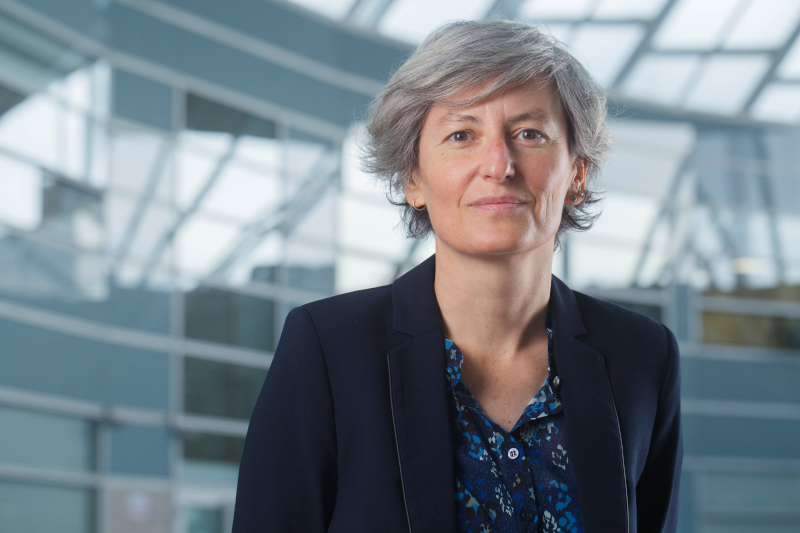Ikerbasque Professor Aitziber L. Cortajarena is taking the helm of the Scientific Direction of the Center for Cooperative Research in Biomaterials –CIC biomaGUNE– after succeeding Ikerbasque Professor Luis Liz-Marzán, who has led the Scientific Direction of the center for the last nine years. Professor Cortajarena is "eager but somewhat overawed” to be undertaking a new phase at CIC biomaGUNE: "Throughout these fifteen years the center has been on a clear upward trajectory. It has progressed from being a center at an initial stage to being a consolidated center that attracts researchers with an outstanding international profile, and is internationally recognized, as endorsed by the María de Maeztu seal of excellence, among other parameters. This is a very special moment for CIC biomaGUNE to launch new challenges, since it is consolidated in many respects."
One of the main challenges facing the new scientific director is to drive the fundamental research being carried out at CIC biomaGUNE "towards more translational research. Our challenge is to transfer this high quality, highly innovative fundamental research –our most solid mainstay– to companies, to industry. We have programs to drive forward this translational research, to encourage the promotion of companies underpinned by the center’s ideas and technologies", she said.
However, Cortajarena does not want to lose the course set by the center over the past fifteen years: "We want to continue in this upward direction; to continue consolidating ourselves as a high-level research center that is recognized internationally; to continue attracting young talent that will open up new lines of research that complement and strengthen the center, to position ourselves in other spheres in the biomaterials field. We also want to continue to make progress in improving aspects such as equality or diversity in the gender balance of our principal researchers, for example."
In the opinion of the outgoing scientific director Ikerbasque Professor Luis Liz-Marzán, Cortajarena "has a very global vision of the center. Her professional background gives her a very broad perspective of the biomaterials field. Not only does she know practically all the researchers at the center, she has also collaborated with them, and this will enable her to see which gaps could be filled by incorporating new research groups, and how to make the best use of the strengths we already have. In addition to all of this, she has a strong but firm personality for dialogue. I believe she has human and professional qualifications that are more than adequate for the position she occupies".
Cortajarena's track record is endorsed by five European projects
Professor Cortajarena received her PhD in Biochemistry from the UPV/EHU-University of the Basque Country in 2002. She then went on to work as a postdoctoral fellow at Yale University (USA) on protein design, structure and function. In 2006, she was a visiting scientist at the Weizmann Institute of Science (Israel). She then continued her work at Yale University as a research associate. In 2010 she joined IMDEA Nanoscience (Madrid), where she developed her independent research group on bionanotechnology, before moving to CIC biomaGUNE in 2016. Besides leading several European projects, including an ERC Consolidator Grant and an ERC Proof of Concept, she received an award from Ikerbasque in 2019 in recognition of her professional career as a researcher and for her scientific contributions.
The laboratory led by Cortajarena is working on four European FET Open projects (part of the Horizon 2020 program), and has just secured a fifth competitive European project in the EIC Pathfinder call for proposals (within the Horizon Europe program). Through its Pathfinder program, the European Innovation Council (EIC) supports research into innovative ideas for radically new technologies and fosters cutting-edge interdisciplinary scientific collaborations. Cortajarena pointed out that these projects "not only allow us to engage in very high quality science at the frontier of knowledge in collaboration with the best European groups, they also allow us to drive forward the application of this science for the purpose of developing new technologies designed to solve the challenges currently facing our society".
The laboratory has very different lines of research that seek to "apply the versatility of the molecular engineering we carry out: we are exploring how we can manipulate biomolecules and combine biomolecules and nanomaterials to generate new tools; how to implement them in very different applications", explained the PhD holder. “These are bioelectronics projects and flexible bioelectronic devices (implantable devices, for example); data storage projects, also based on DNA and nanomaterial technologies; lighting projects; or other sensorics projects." Through the latest project funded by the EIC, the team will be working on "new sensors based on DNA and their interactions with proteins with which we want to detect not just one molecule, but its structural conformation: we want to be able to discern between a molecule in one conformational state and another, to relate them to certain nerurodegenerative diseases (Parkinson's, for example)", she added.

